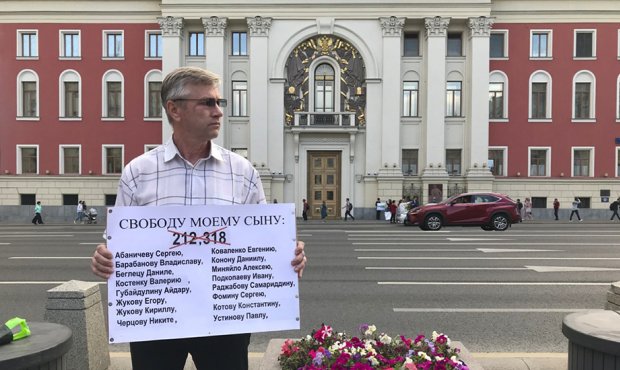
Between the burning Amazon and burning Siberia, Brexit clustercoitus and Hurricane Dorian, there is still some space in the tired news cycle for the tear gas in Hong Kong and broken limbs in Moscow protests. Elections to the local parliament in Moscow have proved unexpectedly difficult for the ruling vertical: by refusing to register oppositional candidates for made-up reasons, the election committee and the Mayor’s office drastically underestimated mobilisation capabilities of the opposition. Result: over a month and a half of “unsanctioned” protests in the city center, police brutality, several high-profile arrests and mass prosecution of random bystanders who happened to be in the melee.
The protests in Moscow are a very local thing, but they are also indicative of a growing dissatisfaction among the Russian population that has manifested in region-specific unsanctioned protests that usually start with seemingly unpolitical issues: landfills in Arkhangelsk and Moscow region, a mall fire in Kemerovo, church construction in Yekaterinburg. Unlike the 2011-2012 protest wave that spread all over Russia, or the more recent pension reform outcry or anti-corruption rally against Prime-Minister Medvedev in 2017, these protests are about several oppositional candidates to the local Moscow parliament – a body with relatively little clout. Moscow electoral committee consistently refused to register oppositional candidates citing allegedly falsified citizen signatures, while the ensued brutal crackdown of the protests only added fuel to the fire.
Live footage of violent arrests, an absolute insane number of police forces and National Guard that most likely outnumbered the protesters in spades, repressive measures by the universities (!) whose students were arrested for the rally organization, did not make Moscow or Russia look good. Moreover, there is an important difference between Hong Kong and Moscow: Russian protesters are consciously trying not to block public transportation routes and the work of governmental buildings or shops, so the accusation of “mass riots” and property damage that is supposed to justify the “yellow vest” level of police brutality is especially galling.
What do Russian media cry? They cry wolf. I mean, West. For starters, the American Embassy allegedly published the protesters’ route and thus was involved in the organization of the rally. The provocateurs obviously strived for a “brutal and striking image” for domestic audience and for the politicians in the West. And most protesters are “not registered in Moscow” anyway, “were educated in the American young leader program” and were “controlled by their curators in social media”, “many from Ukraine” in order to organize a “Maidan” in Russia. Also, didn’t you know that you have similar protest legislation in Sweden and the UK?!
The problem with this narrative is that it is quickly falling apart. Some arrested protesters were let go. Some independent candidates got registered. Even some of Putin’s allies are saying that not letting real opposition run in the Moscow election is dangerous, which probably means that the cliques in Putin’s circle haven’t agreed on one course of action in the face of growing popular discontent. There are no burnt cars or smashed shop windows, but there are distraught parents of arrested students standing in one-person pickets in front of the Mayor’s Office. And that’s one brutal and striking image.
Elizaveta Gaufman is Assistant Professor of Russian Discourse and Politics at the University of Groningen, the Netherlands. She is the author of "Everyday Foreign Policy: Performing and Consuming the Russian Nation after Crimea" (2023) and "The Trump Carnival: Populism, Transgression and the Far Right" (2024).


0 Comments